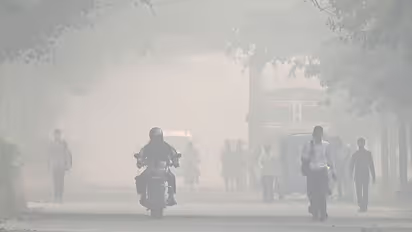AQI in Noida doubles in 24 hours: Officials cite cross-border pollution from Pakistan

Synopsis
This deterioration marks the first instance this season in which all three cities in the National Capital Region (NCR) simultaneously recorded 'very poor' air quality, highlighting a broader concern as pollution levels surge.
As the Diwali festivities draw near, people of Noida, Greater Noida And Ghaziabad have started developing health issues as pollution level has raised in the city. On Sundayt, the AQI in these regions rose to 304, a sixty-five percent raise from the previous 169 on Saturday that categorised the air as 'very poor'. Levels of such toxic pollution and in equal measure provide high vulnerabilities to the population group especially the vunerable.
This deterioration marks the first instance this season in which all three cities in the National Capital Region (NCR) simultaneously recorded 'very poor' air quality, highlighting a broader concern as pollution levels surge. The AQI scale ranges from 'good' at 0-50, 'moderate' at 51-100, 'unhealthy for sensitive groups' at 101-150, 'unhealthy' at 151-200, 'very unhealthy' at 201-300 "hazardous" at 301- 500 with "very poor" at 301- 400 signifying high health risk to affected people.
Cross border pollution has been blamed for this by senior official with Uttar Pradesh Pollution Control Board in Greater Noida, DK Gupta ‘This is the first ‘very poor’ air quality that at least three of the three cities – Noida, Greater Noida and Ghaziabad- have seen all the same day. And our neighboring country – Pakistan – needs to be blamed for this. It has become a trend that there are day by day increasing incidence of stubble burning and are fuming toxic smoke across the border.”
Local factors also plays a large role in the increase of pollution levels. Gupta pointed out that downscaled winds make the situation even worse by bringing pollution and letting the thick smog from stubble burning engulf the area. The local wind speed fell to zero, creating a hazy atmosphere, with visibility dropping to 1,000 meters at Palam and 1,500 meters at Safdarjung. Some air quality monitoring stations reported even higher AQI readings, drifting into the 'severe' category.
Thalapathy Vijay's address sparks debate: No mention of party members' contributions at event?
Meanwhile, Delhi's air quality has shown minor improvement since Sunday but remains in the 'very poor' range, which health authorities regard as hazardous. As of Monday morning, Delhi recorded an AQI of 264, down by almost 90 points from the previous day.
Stay updated with the Breaking News Today and Latest News from across India and around the world. Get real-time updates, in-depth analysis, and comprehensive coverage of India News, World News, Indian Defence News, Kerala News, and Karnataka News. From politics to current affairs, follow every major story as it unfolds. Get real-time updates from IMD on major cities weather forecasts, including Rain alerts, Cyclone warnings, and temperature trends. Download the Asianet News Official App from the Android Play Store and iPhone App Store for accurate and timely news updates anytime, anywhere.